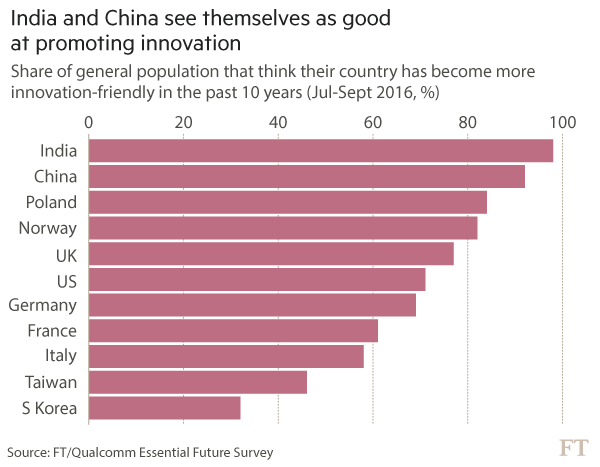Rules and conformity frustrate South Korean tech start-ups

Simply sign up to the Technology sector myFT Digest -- delivered directly to your inbox.
Back in 2014, when Lee Seung-geon, 35, ditched his career as a dentist to set up a financial technology company, bank loans were out of his reach because of South Korea’s strict regulations discouraging banks’ investment in the technology sector.
“I did not even think about getting bank loans as they were not investing in fintech companies,” Mr Lee recalls.
Instead, his mobile payments app, Toss, was funded by venture capital firms in Silicon Valley and Seoul. Toss has become a top-five payments app in Asia by transaction volume in the two years since its launch, having processed about Won2tn ($1.7bn) in transactions and gained more than 5m customers.
“We see great opportunities in the country’s financial services sector, where 90 per cent of banking transactions are done mobile or online,” says Mr Lee. “But there are not many innovative fintech services as regulations discourage new attempts.”
Mr Lee’s company, Viva Republica, is one of the few successful ventures in South Korea’s nascent financial technology service sector.
South Korea has one of the world’s highest broadband penetrations, fast mobile internet speeds and very high smartphone usage, but industry watchers say the advanced telecoms network has not led to high-value innovation. Fintech is not the only concern — there is growing fear that the country is falling behind in high-tech software and service development including the internet of things, online-to-offline services (promoting physical stores), artificial intelligence and big data analysis because of red tape and a risk-averse culture.

A survey commissioned by Qualcomm, the US telecoms group, found many South Koreans feel the country is poor at fostering and protecting technology innovation, surprising some outsiders who see it as a tech powerhouse. The Bloomberg Innovation Index last year ranked South Korea as the world’s most innovative economy, ahead of Germany and Japan, based on indicators such as research and development capability, tech density and patent activity.
Led by large technology companies such as Samsung and LG Electronics, South Korea spends more on R&D than most other advanced economies. This year it was only narrowly beaten by Israel as the top R&D spender, shelling out 4.23 per cent of GDP compared with Israel’s 4.25 per cent.
However, many South Koreans worry that the country is losing its innovative edge as conglomerates such as Samsung focus on hardware, despite growth in the IT industry shifting to software and services. The government has made support for start-up companies central to its policy agenda — but so far there are few cutting-edge technology start-ups with international reach.
South Korea had a popular social networking site called Cyworld, launched in 1999 — before Facebook — but its failure to expand abroad due to language and cultural barriers undermined it at home. The country’s dominant messenger app, KakaoTalk, has tried to go global but made little headway.
“There are few start-ups with really innovative services, with many of them trying to introduce copycat versions of proven overseas models to Korea,” says Lee Taek-kyung, head of angel investor network Mashup Angels.
Although the funding for start-ups has improved under the current administration, which is investing billions of dollars in small companies, they still struggle to grow in the shadow of the big conglomerates — or chaebol — which are dominant in most industries.
“Chaebol dominance in manufacturing and distribution raises entry barriers for start-ups,” says Kang Jeong-soo, director of the Institute for the Digital Society. “The government should focus on offering a level playing field for smaller companies.”
Experts say outdated regulation often blocks innovative ideas. Uber has suspended its ride-sharing service, UberX, in South Korea, bowing to regulatory pressure and protests from taxi drivers. Airbnb, the peer-to-peer holiday rentals service, is grappling with tough regulations restricting its business. Google offers a limited mapping service in South Korea due to the country’s national security laws. South Korea’s internet-only banks have yet to start operations due to regulations limiting non-financial companies’ investment in the sector. Strict regulations around testing autonomous driving technologies and flying drones have also come under fire for hindering technology development.
“In Korea, it’s only legal if the law says it’s legal. In the US, it’s only illegal if the law says it’s illegal,” says Tim Chae, partner at 500 Startups, a venture capital based in Silicon Valley. “The latter optimises for innovation, the former optimises for the status quo. That’s probably the single biggest thing that needs to change.”
The country’s rigid corporate culture and education system are also seen as drags on innovation. Software remains a weakness of Korean tech companies such as Samsung as their top-down culture hinders creativity. “Our conformist, military-style corporate culture does not allow out-of-the-box thinking,” says Mr Lee at Mashup Angels.
South Korea boasts one of the world’s most highly educated workforces but experts say the school system’s focus on rote learning is not suitable for nurturing innovative talents.
“Our schools are still run like a brick factory designed to churn out as many bricks as possible,” says Lee Kark-bum, head of Future Thinknet, a research institute. “It is hard to cultivate risk-taking, innovative talents under the current education system,” he adds.
Comments